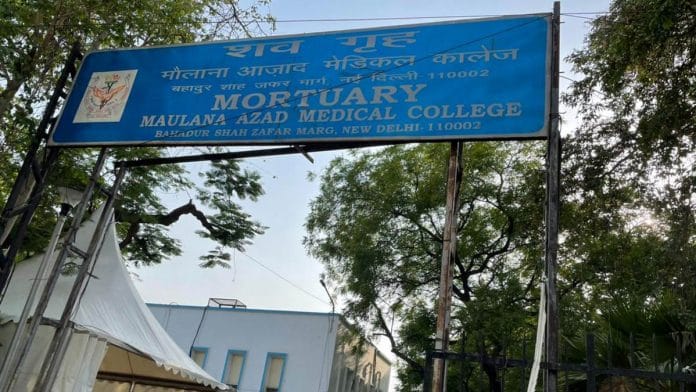New Delhi: A few kilometres away from the chaos and uncertainty that engulfs Lok Nayak Jaiprakash Narayan (LNJP) Hospital, one of the largest Covid-19 facilities in the country, stands a small, unimposing mortuary which, like the hospital, is attached to the Maulana Azad Medical College.
Under the scorching Thursday afternoon heat on 13 May, four mortuary attendants, dripping with sweat in their PPE kits, carefully unload a body from an ambulance and take it inside the morgue, where it will be cleaned, sanitised, and refrigerated in a body bag till the relatives of the deceased come to collect it for cremation in the next few days.
Sandeep Tiwari, 25, is one of 20 workers at the mortuary who gets uncomfortably close to the novel coronavirus every day, but says he isn’t afraid. “God’s looking on from above. People who are helping those in need don’t get sick,” Tiwari says.
“All the mortuary staff preparing the body wear appropriate PPE and are guided by 5-7 professionals in sanitising and packing the bodies in leak-proof body bags,” he explains.
Tiwari says at first, he felt uneasy even to look at the bodies, but has now got used to it. But he is concerned how his family will react if he tells them this is his job — he hasn’t told them yet, and “never will”. He used to work as a security guard at one of the hostels at the Maulana Azad Medical College, but after his contract expired in December last year, he began working at the morgue.
“My family would never approve of me working at the morgue. Tell me, whose family would?” he says.
Sandeep Tiwari is the sole breadwinner for his family, consisting of his mother, father, brother, younger sister and wife of eight months, which lives in Uttar Pradesh’s Gonda district.
Talking about how mortuary staff are often stigmatised, Tiwari says some Covid victims’ families don’t even bother to check if they have identified the body of their loved ones correctly, fearing they might get the disease if they go near.
“Despite seeing us in our PPE kits and taking all precautionary measures, most of the families still think we are infected with the virus. They fail to identify the body of their own loved ones. Two such cases of body mismatch have happened so far,” Tiwari says.
Also read: Funeral queues, grieving families, gasping patients — these photos tell how Delhi is suffering
Fewer bodies this month
According to Delhi’s official health bulletin, the city Friday reported 289 Covid deaths and 8,506 infections — the lowest since 10 April — with a positivity rate of 12.40 per cent.
But even now, every few hours, an ambulance pulls up at the gate of the MAMC mortuary, where a makeshift tent has been set up for grieving families.
Tiwari says: “We are used to the rush, but today, fewer bodies have come in.”
He adds that the team of mortuary workers is handling at least 25 corpses in one shift (from 7 am to 6 pm), while last month, the number was around 60.
Vikram Singh, nodal officer at LNJP Hospital, confirmed that the number of bodies has reduced in the past one week.
“In April, at least 40 to 60 bodies used to arrive at the mortuary in a day but since the beginning of May, we have seen a gradual decline. For instance, Thursday, only 25 bodies were sent to the morgue,” said Singh.
Paid a pittance
Despite handling infected bodies for such long hours, mortuary workers get paid a moderate amount — Tiwari earns Rs 15,500 per month. They get Sundays and national holidays off.
Asked how his family makes ends meet, he says: “Some of my friends in my village have remained jobless for months; many of them still are. Although the amount is less than what I used to earn as a guard, I don’t want to complain. Jobs are very difficult to find in the current lockdown situation in Delhi.”
The hospital used to send daily meals to these attendants during the first Covid surge in the city, but that’s no longer the practice. Tiwari has requested the mortuary in-charge to resume the provision of meals, but there has been no response yet.
The workers, who come from outside the city, are accommodated at a nearby paying guest house by the hospital, but they are arranging for the meals themselves.
‘Living a nightmare’
Another mortuary worker, who does not wish to be named, guides a grieving relative to the ambulance where a body awaits. This worker has recently been shifted from the Operation Theatre to the mortuary, but sees no difference. “Both are like living a nightmare,” he says.
However, even worse than the tasks at work is the thought of returning home and possibly passing on the infection to his family. Even at home, we wears two masks every day.
“I would never want my family to get Covid because of me, but I can’t give up this job either,” the second worker says. “My daughter is just five years old. If she tests positive because of me, the guilt will kill me.”
(Edited by Shreyas Sharma)
This report has been updated to accurately reflect that Sandeep Tiwari earns Rs 15,500 per month, and not Rs 1,550. The error is regretted.
Also read: Delhi man buries ‘father’ twice, after two Moinuddins got mixed up at Maulana Azad mortuary






